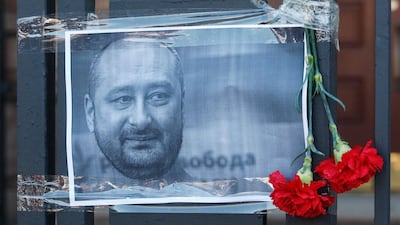Ukraine has accused the Kremlin of responsibility for the murder of a prominent Russian dissident journalist – forced to flee his homeland last year – in Kiev on Tuesday, but Moscow quickly decried the allegation as an anti-Russian smear.
Arkady Babchenko, a critic of President Vladimir Putin and veteran war correspondent, was shot dead on Tuesday in the Ukrainian capital, where he lived in exile. He fled Russia after he received threats for saying he did not mourn the victims of a Russian defence ministry plane crash in a 2016 Facebook post.
Ukrainian Prime Minister Volodymyr Groysman said in a social media posting late on Tuesday he was convinced that what he called "the Russian totalitarian machine" had not forgiven Babchenko for what the Ukrainian leader called his honesty.
"The killers should be punished," he wrote. The Ukrainian Interior Ministry released a sketch of a suspect wearing a cap and showing a beard, aged around 40 to 45-years-old.
Russian Foreign Minister Sergei Lavrov said Ukraine’s accusation was “very sad” as an investigation into the incident had yet to begin.
Kremlin spokesman Dmitry Peskov described allegations by Ukrainian government officials that Moscow was behind the murder as “the height of cynicism” and said he hoped other countries would lean on Kiev to do more to protect journalists.
His wife found him bleeding outside their apartment block with gunshots to his back. He died in an ambulance on the way to hospital. He had been on his way to buy bread where the killer was lying in wait for him, according to Ukrainian lawmaker Anton Herashchenko.
Kiev police chief Andriy Krishchenko said the “first and most obvious” reason for Mr Babchenko’s death was his “professional activities”. He had criticised President Putin’s Crimea and Syria campaigns and had run in unofficial elections in 2012 that had been organised by the Russian opposition.
Russia called for an investigation, but accused the Ukrainian government of “bloody crimes”. A top Russian lawmaker offered to help Kiev with the probe.
Vyacheslav Volodin, speaker of the State Duma, told Russian news agencies Wednesday that Russia would be happy to assist with the investigation if Ukrainian authorities requested it.
But Kiev hinted that its probe would focus on Russia as the suspected perpetrator of his murder. Mr. Gerashchenko said investigators would examine “the actions of Russian intelligence agencies to get rid of those who are trying to tell the truth.”
Russia’s Investigative Committee, a law enforcement agency, said it had launched its own probe because it “is not going to ignore brutal crimes against Russian citizens”.
_______________
Read more:
Russian opposition leader arrested at anti-Putin protest
Russia-Germany gas pipeline raises intelligence concerns: US
_______________
Journalists and politicians condemned his murder. "I'm so tired of finding out that my friends, acquaintances and people I know keep getting killed," wrote Russian opposition politician Dmitry Gudkov.
Independent Russian journalist Yevgenia Albats tweeted in Russian: "There was not a single reason for Arkady Babchenko's murder apart from what he wrote. No other reason."
"I call on Ukraine authorities to conduct immediate & full investigation," Harlem Désir, the media freedom representative at the Organisation for Security and Cooperation in Europe, tweeted.
The 41-year-old journalist had spoken publicly about the threats against his life and the fear that drove him to leave Russia.
“Like many dissidents I am used to abuse, but a recent campaign against me was so personal, so scary, that I was forced to flee,” he wrote for British newspaper The Guardian in February 2017.
He is the latest in a string of Russian dissident journalists to be targeted in an apparent retaliation for their work. In 2006, Anna Politkovskaya, who chronicled the killings and torture of civilians by the Russian military, was shot dead in her apartment.
Two years later, Mikhail Beketov suffered brain damage and lost a leg after a brutal assault in 2008 following his reporting and campaign against a highway project against Moscow. He died five years later. Anastasia Baburova, Khadzhimurad Kamalov were both killed in central Moscow and Makhachkala, the capital of the Dagestan region, respectively in the years after.
Kiev has become a bolthole for Russian dissidents, but they have still been able to be targeted in the Ukrainian capital. Last year, Russian lawmaker Denis Voronenkov was shot and killed outside a hotel in Kiev. He had fled to the country as he feared for his life in Russia.

